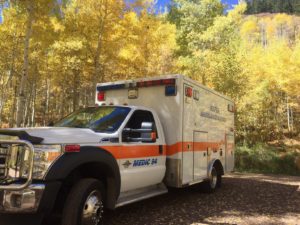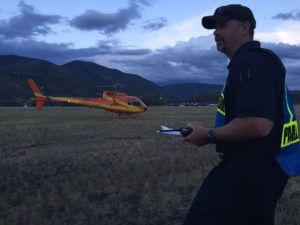Paramedics do a lot more than just get you to the hospital
Many people think paramedics just come to your home, put you in the ambulance and take you to the hospital. In fact, though, today’s paramedic is a true medical practitioner with a broad scope of top-level skills, from treating traumatic injuries to administering medications to delivering babies.
And that’s not the only surprising fact about the unpredictable, dangerous, demanding, stressful and ultimately rewarding lives of the men and women who provide prehospital care in the Roaring Fork Valley.
 Years of training
Years of training
Becoming a paramedic takes years of schooling. After completing an emergency medical technician (EMT) course, it can take more than two additional years to earn paramedic certification. From there, one can go even further to become a critical care paramedic with expertise in medical specialties such as pharmacology, pain management and cardiology.
According to Gabe Muething, paramedic and director of the Aspen Ambulance District, a community-wide ambulance service managed and administered by Aspen Valley Hospital (AVH), the Aspen Ambulance District’s staff includes 12 critical care paramedics, an unusually high number for an area like ours. The extra training comes in handy. Generally, paramedics work from care protocols that guide diagnosis and treatment of patients. If a paramedic needs to go beyond the protocol, he or she will contact AVH’s emergency department and speak directly with a physician.
“At that point we are the eyes, ears and hands of the physician, and we can follow through with the doctor’s order,” Gabe said. “However, there are places where cell phones and radios don’t work, and our staff has to be independent practitioners in case we can’t consult a physician.”
A community of cooperation
Before moving here eight years ago, Gabe worked in inner-city Indianapolis. One of the major differences he has observed in the change of setting is the level of cooperation among various public-safety organizations.
As a prime example, he named the Pitkin County Incident Management Team, an inter-agency group that plans for a coordinated response to large-scale emergencies, such as a bus crash or wildfire.
“I can honestly tell you that I have never seen a community that has such strong relationships between all of its public-safety agencies as Aspen has,” Gabe said. “The fire department, EMS, law enforcement, mountain rescue, ski patrol — how they all come together to deal with an emergency is amazing. You don’t see that kind of cooperation everywhere.”
 Making good use of downtime
Making good use of downtime
You wouldn’t know it from watching popular medical shows on TV, but the life of a paramedic can also be…well, a little boring at times.
“Believe it or not, even paramedics have downtime now and then,” explained Gabe. “We use that time to conduct ongoing training, maintain our equipment, check our supplies — they don’t show you that part of it on TV, but it’s also very important.”
No two days alike
Whether treating a heart attack patient en route to AVH, transferring a skier with head trauma to Denver, taking part in ongoing training or working with peers on disaster planning, paramedics have to be quick to respond to whatever need is at hand. They are the ultimate generalist. “There’s no such thing as a specialist in our field,” Gabe explained. “It requires a jack-of-all-trades, prepared to deal with all types of medical conditions.”
“The thing I’ve always loved about being a paramedic is that every day is different and unpredictable,” Gabe said. “No matter what you’re doing — sleeping, eating, watching a training video — when a call comes in, you have only seconds to respond. Then you head out down the road, not knowing what you’re going to find.”

